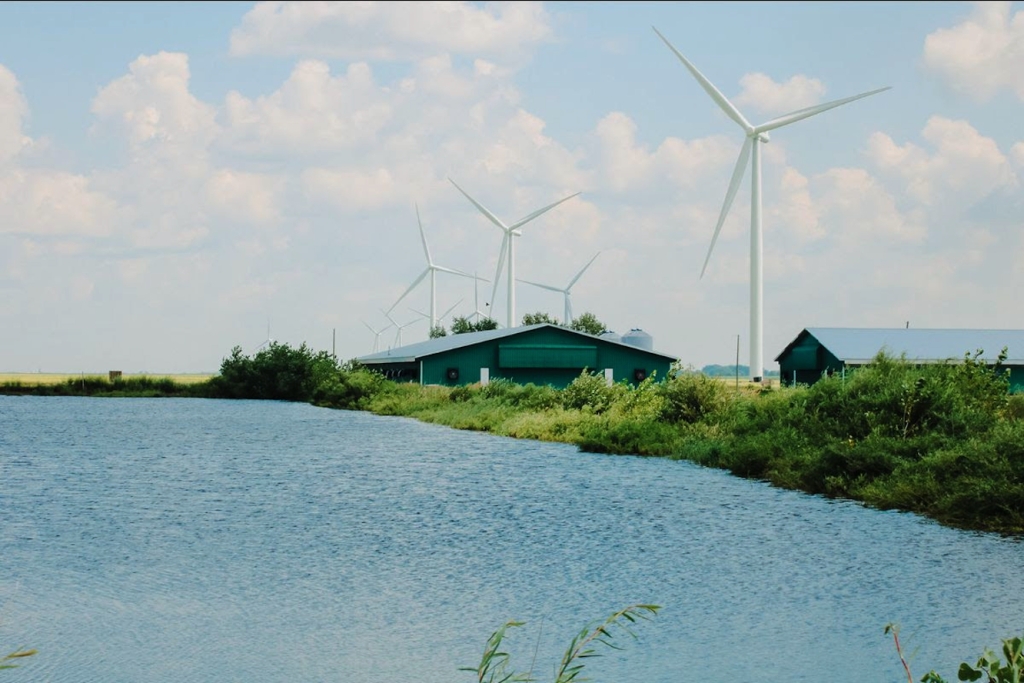
include Lake Winnipeg and the Red, Winnipeg, Saskatchewan and
Dauphin rivers. Photo courtesy of Manitoba Pork.
On August 27, the Manitoba government announced the establishment of nutrient targets to protect Manitoba’s lakes and rivers for future generations. Through the Water Protection Act, the Nutrient Targets Regulation will include Lake Winnipeg and the Red, Winnipeg, Saskatchewan and Dauphin rivers. It commits Manitoba to report regularly on progress towards implementing the targets and actions underway to reduce nutrient levels in water-bodies in Manitoba. This provides a measurable benchmark to effect real change in protecting Manitoba’s waterways.
“Farmers, including those in Manitoba’s hog sector, are taking significant steps to help address today’s environmental challenges, including protecting our lakes and waterways across the province,” said Rick Préjet, chair of Manitoba Pork. “Manitoba’s hog sector is committed to being part of the solution in the future and protecting our environment, all while producing more food for consumers in Canada and worldwide. Having reliable data is a key step on this path forward.”
Environment and Climate Change Minister Tracy Schmidt said this is a significant step in protecting Manitobans’ water quality.
“This regulation for Lake Winnipeg and its tributaries sets the first-ever formal nutrient reduction target for improving water quality in Manitoba’s history. Establishing nutrient targets for our cherished rivers and lakes is essential in protecting those waterways for future generations,” said Schmidt.
Rick Préjet commended Minister Schmidt’s collaborative approach to addressing water quality concerns. Gathering data, involving all stakeholders, and focusing on long-term strategies are important to address environmental challenges effectively.
He believes the industry can contribute to sustainable solutions by reducing finger-pointing and focusing on facts. This cooperation will allow targeting specific areas of concern and finding the best ways to move forward, especially in protecting lake water quality.
He reemphasized the importance of not blaming one group for water quality issues. He pointed out the situation’s complexity, highlighting that multiple factors, including urban areas like Winnipeg and the vast watershed feeding into the lake, play a role. Préjet believes it’s essential to recognize the size and scope of these contributing factors, which is why he appreciates a fact-based, collaborative approach to finding solutions for the long-term benefit of the environment.
The Notre Dame, MB hog producer said the hog industry has already implemented regulations for managing manure, viewing it as a valuable resource due to rising fertilizer costs. Using soil and manure testing, producers strategically place manure to maximize crop benefits.
“Much of this is already in place, and technological advancements have drastically reduced water usage in pork production compared to 20-30 years ago. These are key steps the hog industry has taken to minimize nutrient runoff and improve environmental sustainability,” said Préjet.
He expresses confidence in the hog producers’ readiness to adapt if future data reveals additional steps to reduce nutrient runoff. Manitoba Pork already has a strong relationship with producers, built on respect and trust in the decisions made by the Pork Council. With this foundation, he believes the industry will be receptive to any necessary improvements and continue collaborating to improve environmental sustainability. With the producers committed, any new actions will build on the existing efforts.
Préjet acknowledges that some groups seem more focused on stopping hog production than genuinely addressing environmental concerns. He notes that many past criticisms are no longer relevant as the hog industry has made significant strides in environmental sustainability. The industry continues to produce quality products at a reasonable price while adhering to sustainable practices. Préjet emphasizes the importance of collaboration with all stakeholders, expressing gratitude for the cooperative approach to addressing environmental issues and ensuring a solid future for the hog industry.
“This regulation is a welcome addition to the efforts to improve water quality across the Lake Winnipeg Basin,” said Ted Preister, executive director of the Red River Basin Commission.
The Red River Basin Commission believes these targets are essential in bringing Manitobans together to address threats to the precious waters. Provincial leadership in setting these goals is a major driver in promoting further action throughout the basin. •
— By Harry Siemens





